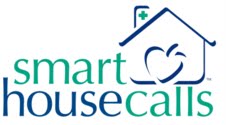 Troy Heidesch, Founder of Smart HouseCalls, speaks to students about starting a business.
Troy Heidesch, Founder of Smart HouseCalls, speaks to students about starting a business.
Remember the blog post in December about Dr. Toby Bond? Well as it turns out, Troy Heidesch consults as a part-time Nurse Practitioner in his office and is equally as innovative. Troy is founder of Smart HouseCalls, a new start-up which connects patients to their physicians more effectively using webcam technology. His system is HIPAA compliant, high definition, stable, secure and most importantly, billable. Using this technology, quick follow-ups and educational meetings can be arranged over the internet face-to-face with the provider rather than over the phone with the office staff. This has the potential to make an enormous impact in rural areas where access to healthcare is a serious issue as well as add convenience to patients who might not otherwise follow-up due to a busy schedule. I was able to sit down with Troy to discuss his work during the start-up process--hopefully you'll find his insights helpful.
Q: Tell me what you're up to.
A: I am the founder and CEO of a Biotech startup called Smart House Calls. We have built a telemedicine platform that allow physicians to communicate with patients from anywhere to anywhere with an internet connection and then charge either the patient or the insurance company for that interaction. This improves patient access to timely and convenient care, decreases emergency room visits, and is an income accelerator for primary care providers.
Q: What has been the most challenging part about starting a business?
A: Patience and getting over self-doubt. You expect that a great idea will sell itself. After a few months you realize that success is in the execution rather than in the idea and execution takes time. I believe that self-doubt is common to most entrepreneurs. You think, “Who am I to build a potentially very large enterprise?” Then, as you immerse yourself into trying to succeed, you start seeing that you are really no different than other successful entrepreneurs. You read voraciously, talk with anyone who will listen, and suddenly you find that you are executing and doing a respectable job.
Q: How have you changed your clinical practice to allow time for your business?
A: I work as a consultant for primary care practices seeing patients and then installing our system. This is now giving way to full time within the company as sales begin to ramp up. I get up at 5 AM, do a little work for Smart House Calls, go see patients, and then work until about 7 or 8pm before spending some time with my family. On the days when I do not see patients, the hours remain about the same (and that includes weekends!).
Q: What should students who have entrepreneurial interests be doing to prepare for a different career when they graduate?
A: Read. Great book to start with is “The E-Myth Physician” by Michael Gerber. Decide whether you want to be an employee in your own business or be a CEO at the beginning. They are VERY different from each other. A physician as an employee will spend the day seeing patients and spending time every week to make sure the staff is paid and will pay attention to billing. The CEO will build systems that will work regardless of personnel and will be able to scale. They will spend most of their time thinking five years ahead and implementing strategies to push the business in the direction they envision.
Q: Any other comments?
A: If you have a great idea, talk about it to everyone person you meet. Do not worry about someone stealing your idea. Ideas are a dime a dozen, it’s the execution that is hard. By talking with everyone about your idea or plan, you will gain insight into the marketplace to help determine whether you really have something that people would want to pay to get. Finally, drop any ego or worry of losing control, hire people who are obviously much better than you. They will make you better and will pull your business to success much faster (success may not happen at all without this type of talent). A people should hire A people. If you hire B people they will hire C people and so on. Your idea will flounder and die if your first hires or partners are not exceptional.
So readers, what are your questions about starting a business? Leave comments and we'll get the discussion started.
A big thanks to Troy for his time and insight into these issues. For more information, see their website at SmartHouseCalls.com.
 Debt,
Debt,  Finance,
Finance,  Loan,
Loan,  Medical School Students
Medical School Students 






"I wouldn't do it twice, but I would not 'not' do it once."
- ZDoggMD